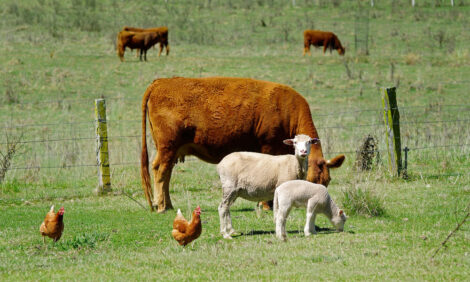



Partnership to Coordinate Chinese-EU Animal Health Research
CHINA - China's exponential economic growth over the last decade has been accompanied by a sharp increase in consumption of animal products. Today, China is the world's largest livestock producer and consumer.According to the FAO, the intensification of livestock production has run in parallel with increased urbanisation, a growing human population, increasing international trade of animals and animal products and the expansion of agricultural areas at the expense of wild habitats.
These economic, social and demographic shifts affect livestock production and increase the potential for new pathogens to emerge, grow and spread from animals to humans on a global scale. These diseases can spread over long distances and have an enormous impact on trade and livelihoods. Therefore, the effective prevention, control and eradication of these infectious transboundary animal diseases (TADs) is crucial for safeguarding and securing national and international food supplies and human health. This will be most efficiently done through coordination of international research on animal health.
The recently established LinkTADs research consortium is a 1 million Euro initiative funded under the European Commission's Seventh Framework Programme (FP7), which aims to coordinate research on animal disease control (i.e. epidemiology and laboratory diagnostics) between partners in the European Union (EU) and China. By fostering networking between scientific institutions, LinkTADs will establish systematic linkages between on-going animal health research, training programmes and innovation projects in the EU and China.
LinkTADs will serve to harmonise and coordinate the vast amounts of information available on animal health research. Due to the internet and other technologies, information-sharing between academic and public fora has increased exponentially. However, online information tends to be about past events rather than future animal health trends and risks. Furthermore, a large amount of research on animal health ends up partially or wholly duplicated, at times even within the same country or organisation. Duplications and inefficient use of limited resources, including funds, personnel, reagents and time, increase costs and delay scientific progress.
While international research collaborations bring together new ideas, technologies, funds and expertise to solve today’s livestock health challenges, there are also many barriers that challenge these joint projects, including regulations, policies, politics and languages. Over the past decade, a number of coordination initiatives have been created to manage and remain current with new funding sources, frameworks, platforms and programmes.
LinkTADs is one of those much-needed initiatives that aims to: (i) coordinate research across borders; (ii) aid in finding common research goals; (iii) guide partners along the process; and (iv) create sustainable and simple mechanisms to preserve collaborations in the future. Under the LinkTADs umbrella, scientists from the EU and China will benefit from each other’s knowledge, skills and equipment. Most importantly, they will have access to a wider pool of funding programmes.
The Food and Agriculture Organization of the United Nations (FAO), in its role as coordinator, organized the kick-off meeting of LinkTADs on 9 and 10 December 2013 at FAO headquarters in Rome. The LinkTADs consortium is composed of five European and five Chinese partners as well as FAO, incorporating some of the major scientific players in the animal health field in the EU and China. The first meeting of the LinkTADs consortium at FAO was an opportunity for the partners to get to know one another and clarify the work plan for the next months.
Partners also discussed the overall objectives of the LinkTADs platform, including: (i) identifying priority areas for join action; (ii) linking European and Chinese animal health research programmes; (iii) ensuring a wide-ranging network of scientific communities and stakeholders; (iv) providing a long-term vision and achieving coordinated planning on future common research; (v) contributing to the international policies related to EU animal health and trade; (vi) improving the research capacity of organizations by supporting young researchers through exchange programmes and training; and (vii) sharing the results and methodologies within and outside the consortium.
By 2016, LinkTADs aims to have established this ambitious platform that will allow European and Chinese partners to coordinate future research in animal health and address transboundary animal disease drivers at a global level.











